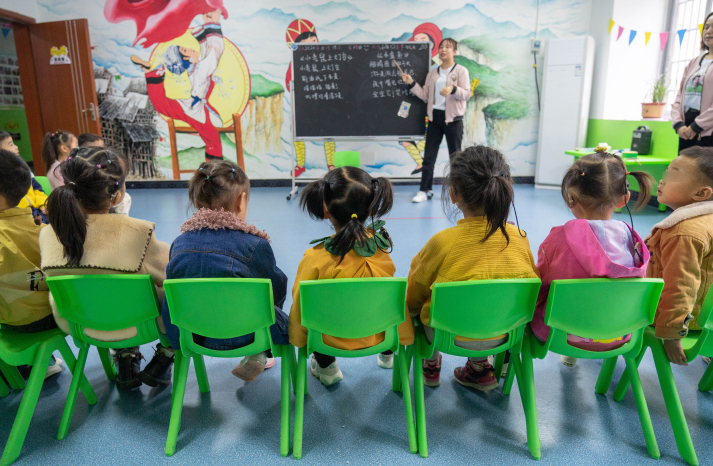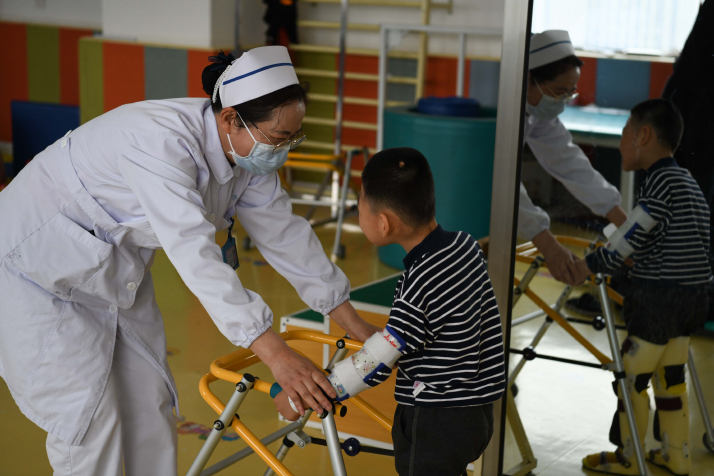
Yang Yang, Chairman of the China Association of the Deaf and Hard of Hearing, lost her hearing at 4. This year, as a member of the 14th National Committee of the Chinese People’s Political Consultative Conference (CPPCC), the country’s top political advisory body, Yang put forward a proposal on inclusive education of children with disabilities. Specifically, her proposal suggests more children with hearing problems should be learning in mainstream classrooms.
Yang has benefited from inclusive education, though she faced many difficulties. For instance, she initially had trouble understanding the teacher during class but later she gradually developed the ability to lip-read, which has helped her a lot in her life.
Nowadays, most students with hearing impairment receive inclusive education in regular schools, Yang told Beijing Review. “The number of schools for hearing-impaired children is decreasing year by year, and the majority of students in them usually remain there as they also have other disabilities,” she added.
Based on a survey of parents with hearing-impaired children, she suggested that schools should not overlook the abilities of students with severe hearing impairment after receiving hearing aids and speech training. At the same time, teachers should not lower their expectations of deaf students’ learning abilities, as it demotivates them.
In the past, the majority of hearing-impaired individuals in China were unable to speak due to the inability to hear the sounds of speech they need to reproduce. That has become a thing of the past with the increasing availability of hearing aids and other assistive devices, Yang said. The progress is also a result of progress in China’s system of support for children with disabilities.

Growing in love
Since the 1980s, support for children with disabilities has been included in China’s overall plan for economic and social progress. In June 2018, the State Council issued opinions on establishing a support system for children, which were implemented four months later.
The changes provide basic services such as surgical treatments, training and assistive devices to orphans and children from economically disadvantaged families aged 0 to 6 with visual, hearing, speech, physical and intellectual disabilities, and autism.
“The period from 0 to 6 years old is considered the prime time for children’s treatment, with the most potential to improve their abilities, better enabling them to attend school and secure employment in the future,” Zhou Hongling of China Disabled Persons’ Federation (CDPF) told Beijing Review. Over the past five years, all regions have enhanced financial aid and developed a service network to improve the support system for disabled children, she added.
Zhang Xiaobo has been undergoing treatment for autism at Xi’an TCM Hospital of Encephalopathy in Shaanxi Province for 10 years. The hospital, which also specializes in degenerative diseases of the brain, is one of the rehabilitation institutions designated by CDPF to support disabled children.
From previously uttering two words at most, Zhang has made remarkable progress in communication. He can also create colorful drawings under the guidance of staff. “I will continue to bring him here for the services as persistence leads to changes,” his father told CPPCC Daily.
Prior to the 2018 changes at the national level, Xi’an had implemented a program to provide support and treatment services for disabled children aged 0 to 6 in 2014, and expanded it to cover children under 16 in 2018, according to a document released by Xi’an Disabled Persons’ Federation. Thanks to the policy, Zhang receives an annual subsidy of 28,000 yuan ($3,889.8), and his family only needs to cover their living expenses to support his ongoing recovery.
Zhou said local governments are the main bodies providing the assistance, and cities have designed a variety of standards according to their specific conditions. In addition, enhancing medical insurance also provides help for children with disabilities caused by diseases.
Not one less
According to CDPF, the Central Government has increased its spending on rehabilitation for disabled children from 1.4 billion yuan ($194.4 million) in 2018 to 2 billion yuan ($277.8 million) in 2021. Local governments have also stepped up their efforts. As a result, there are now enough funds to cover all eligible applicants.
This funding has not decreased despite the impact of the COVID-19 pandemic, Zhou said, adding nearly 2 million applications have been accepted nationally over the past five years.
The number of designated rehabilitation centers for disabled children has increased from over 5,100 in 2018 to more than 9,300 as of the end of 2023. “This expansion enables more disabled children to access rehabilitation services within their communities, effectively alleviating financial and caregiving burdens on families,” she continued.
The age limit for disability assistance programs has been increased in 21 provinces, autonomous regions and municipalities. Some of the services now cover people up to the age of 17.
Nineteen provinces, autonomous regions and municipalities, and several lower-level governments have abolished the financial qualification requirement for families seeking rehabilitation assistance.
Subsidies in 30 provinces, autonomous regions and municipalities have increased from the national standard of 12,000 yuan ($1,667.1) per person per year during the 12th Five-Year Plan (2011-15) period. For example, in Zhejiang Province in east China, applicants are eligible to receive 24,000 to 30,000 yuan ($3,334.3-4,167.9) according to their specific needs. Many local governments are also providing living and transportation subsidies and on-site rehabilitation services to families in need.
Way to go
“Subsidies and other assistance have ensured support and treatment for disabled children and alleviated their families’ financial burdens. But in addition to physical treatments, we should also highlight their other needs such as psychological support and social integration,” Long Mo, a CPPCC National Committee member and President of China Foundation for Disabled Persons, told CPPCC Daily.
She said treatments for diabilities are often long processes, and the psychological care for both children and their parents needs the joint efforts of schools, related institutions and society.
Zhou hopes to win more support for disabled children, and deepen people’s understanding of relevant policies and knowledge.
She also suggested support for disabled children, which is mostly provided at the district/county level, and needs for local governments to establish an information-sharing mechanism with the local disabled persons’ federations to create higher efficiency and increase effectiveness. Considering the shortage of related professionals, it is necessary to improve the training system and the treatment personnel in the sector.
Compared to some Western countries, where the disability support industry has a history of 100 years, China has made significant progress, Zhou concluded. –The Daily Mail-Beijing Review News exchange item





